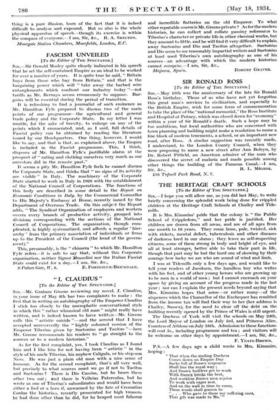FASCISM UNVEILED
[To the Editor of THE SPECTATOR.]
SIR,—Sir Oswald Mosley quite clearly indicated in his speech that he set the self-contained Empire as an ideal to be worked for over a number of years. It is quite true he said, " Britain buys from those who buy from Britain," and that is the bargaining power which will " take away the barbed wire entanglements which confront our industry today "—not tariffs as Mr. Bernays seems erroneously to suppose. Bar- gains will be essential during the period of transition.
It is refreshing to find a journalist of such eminence as Mr. Hamilton Fyfe prepared to discuss two of the main points of our programme—the agricultural and general trade policy and the Corporate State. In my letter I was unable, for the sake of brevity, to enlarge on any of the points which I enumerated, and, as I said, full details of Fascist policy can be obtained by reading the literature issued by our Headquarters. One thing, however, I would like to say, and that is that, as explained above, the Empire is included in the Fascist programme. This, I think, disposes of Mr. Hamilton Tyfe's justifiable alarm at the prospect of " eating and clothing ourselves very much as our ancestors did in the remote past."
It seems a pity Mr. Hamilton Fyfe feels he cannot discuss the Corporate State, and thinks that " no signs of its activity are visible " in Italy. The machinery of the Corporate State started to work in Italy in 1926 with the establishment of the National Council of Corporations. The functions of this body are described in some detail in the Report on Economic Conditions in Italy, by the Commercial Counsellor to His Majesty's Embassy at Rome, recently issued by the Department of Overseas Trade. On this subject the Report adds, " The Syndical Organization of employers and workers covers every branch of productive activity, grouped into divisions corresponding with the sections of the National Council of Corporations. The organization, though com- plicated, is highly systematized, and affords a regular hier- archy ' from the primary association of individuals or firms up to the President of the Council (the head of the govern- ment)."
This, presumably, is the " chimera " to which Mr. Hamilton Fyfe refers—it is safe to say that, without this Corporate organization, neither Signor Mussolini nor the Italian Fascist State could exist for a day.—I am, Sir, &c.,








































 Previous page
Previous page